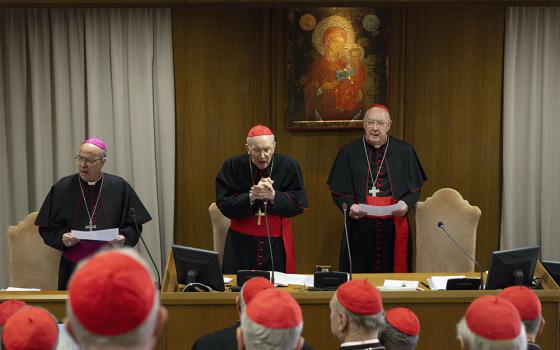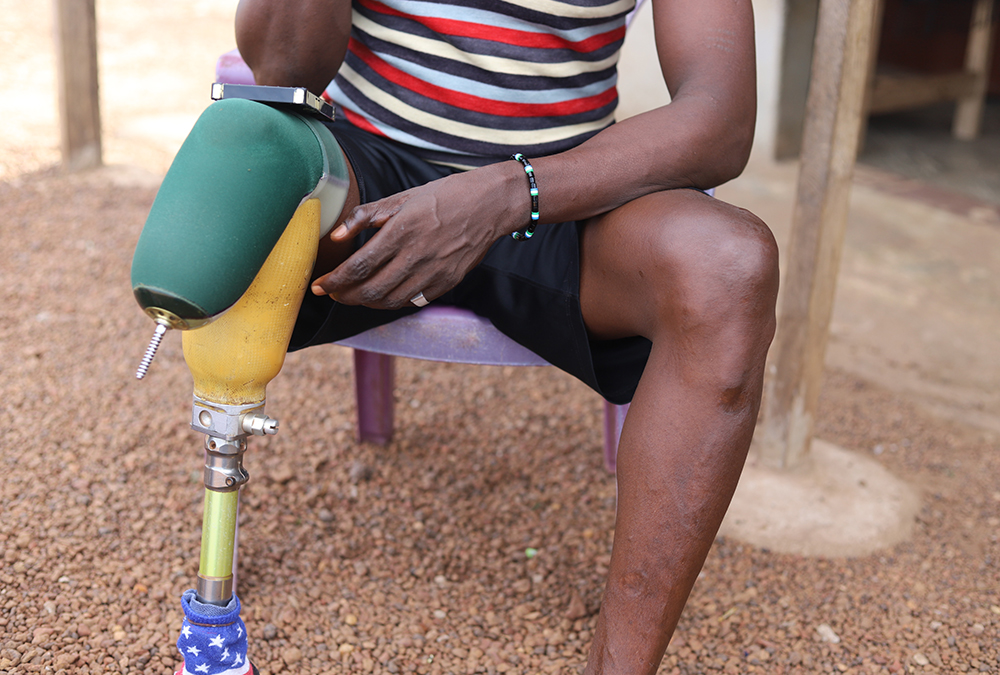
Mohamed Santigie Bangura, 45, shows off the scars of the injuries he sustained during the 1991-2002 civil war in Sierra Leone. Since the end of the civil war, religious sisters have been helping survivors and perpetrators deal with trauma and bringing them together to forgive each other and reconcile. (GSR photo/Doreen Ajiambo)
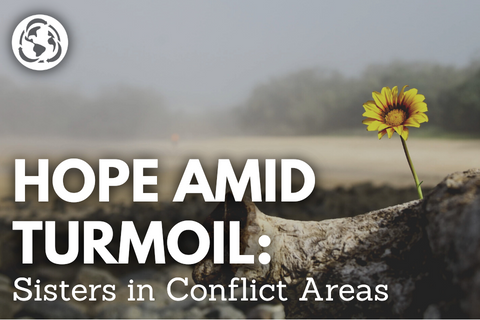
In the leafy suburbs of Oslo Amputee Camp in this northern town in Sierra Leone, a three-hour drive from the capital city of Freetown, survivors and perpetrators of the 1991-2002 civil war live side by side as neighbors and even friends.
Here, Maria Tu Sesay and her neighbor, Amara Sahr Kemba, have become best friends. But 21 years ago, at the height of the country's civil war that killed an estimated 70,000 people and displaced roughly 2.6 million people — more than half the population at the time — Kemba and a group of rebel soldiers murdered Sesay's family, raped her, cut off her toes, and left her for dead.
"Sesay has been able to forgive me, and we shake hands and communicate daily," said 40-year-old Kemba, a former child soldier whom a rebel group forcibly recruited into their ranks when he was 13. "When I met her during reconciliation sessions and knelt, cried and begged her for forgiveness, she forgave me. I told her I felt bad how my actions that I did unknowingly, or was forced to do, affected people."

Maria Tu Sesay recounts the horrific experience she went through at the hands of rebel soldiers during the civil war in Sierra Leone that lasted from 1991 to 2002. Through the reconciliation efforts of religious sisters, she has been able to forgive her attackers. (GSR photo/Doreen Ajiambo)
On her part, Sesay told Global Sisters Report, "I have now forgiven Kemba and others and am sure that is what God wants, too. I don't feel bad at all. I pray for Sierra Leone always to remain peaceful. Hate is not good. There are bigger things in life than what happened in the past, and now life has to go on."
Sesay and Kemba are among hundreds of thousands of survivors and perpetrators who have benefited from religious sisters and other organizations fostering healing and reconciliation in various communities in Sierra Leone since the 11-year-long civil war was officially declared over on Jan. 18, 2002.
During the bloody civil war in this West African nation of more than 8 million people, Foday Saybana Sankoh, the founder and leader of the Sierra Leone rebel group Revolutionary United Front, or RUF, launched a brutal civil war in March 1991, from the east of the country near the border with Liberia to overthrow the government of then-President Joseph Saidu Momoh. Sankoh had the backing of the Liberian warlord (and later president) Charles Taylor.
Observers have reported that indeed, Taylor, who was Sankoh's close friend, having trained together in Libya at one of Moammar Gadhafi's training camps for fledgling revolutionary movements on the continent, provided weapons and ammunition to the RUF rebels during their fighting in Sierra Leone.
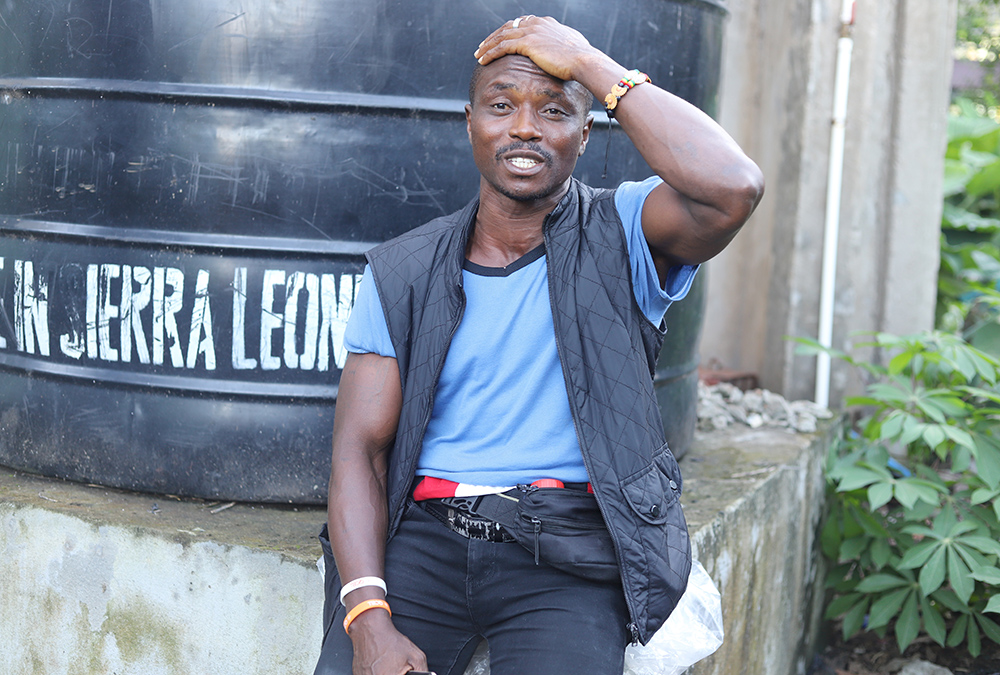
Amara Sahr Kemba, 40, a former child soldier, narrates how he used to kill people under the orders of rebel commanders during the civil war in Sierra Leone from 1991-2002. He has benefited from religious sisters' peacebuilding program to help survivors and perpetrators recover from the deep hurts and divisions caused by the conflict. (GSR photo/Doreen Ajiambo)
This civil war resulted in human rights violations. Sankoh's RUF forcibly recruited and used thousands of child soldiers. They killed and injured civilians, cutting off limbs, lips and ears with machetes. According to one report, an estimated 27,000 people suffered amputations or were disabled during the civil war. The RUF raped women, robbed families, and looted homes, businesses and medical facilities, according to Human Rights Watch.
"The main cause of the war was the selfish interests in the diamonds and the dictatorship from the president at that time," observed Sr. Elizabeth Onwuama of the Missionary Sisters of the Holy Rosary, who witnessed the civil war in the initial stages before she fled for safety in 1994 to Guinea and finally to Nigeria. According to GlobalData, the West African nation was the world's eighth largest producer of diamonds in 2022, with output up by 7% in 2021. "Some of the soldiers didn't like how the president was running the country at the time."
Onwuama explained that Taylor's involvement in the war was to take control of Sierra Leone's diamond mines. "Those who sponsored the war were interested in the diamonds, and that's why when they came, they established themselves in areas that are rich in diamonds," she said.
The Nigerian-born nun also noted that the extreme suffering of people from lack of development, poverty, hunger, and poor health acted as a catalyst for civil war.
"At the time, people were not receiving salaries, and the civil servants were also agitated by the situation," she explained, noting that she "worked in a government school for six months just before the war, and we had not been paid for all those months."
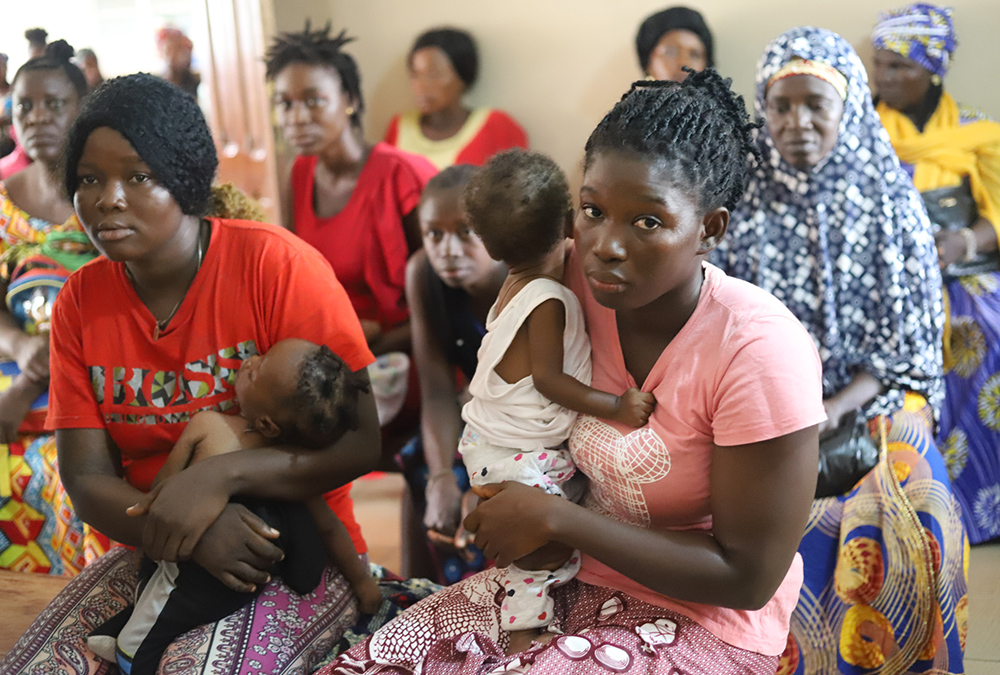
Residents of Oslo Amputee Camp in Makeni, a town in northern Sierra Leone, attend one of the religious sisters' sessions on peace, healing, and reconciliation, Sept. 19. After the end of the war in 2002, religious sisters in Sierra Leone have been carrying out sessions on forgiveness and reconciliation. (GSR photo/Doreen Ajiambo)
Seeking forgiveness
When the civil war ended in 2002, Onwuama and dozens of religious sisters from different congregations who had fled the country returned to assess the situation with the aim of continuing with their ministries, which included working as child care workers, nurses, educators, parish ministers, social workers, chaplains, and spiritual directors.
"After the war, so many people I knew had been killed, and others were amputated," lamented Onwuama, admitting that the war had left an enduring scar on the nation and the collective psyche. "The stories I heard from victims were traumatic to me. Some women told me how they dropped their babies along the way because they couldn't run with them. Some handed their babies to others while others killed them."
Onwuama and the other sisters wanted to make a change.
The sisters started visiting victims of the civil war in Makeni and other towns throughout the country where the government and aid agencies had built houses after the war so that Sierra Leone's estimated 27,000 amputees and other victims had somewhere to live.
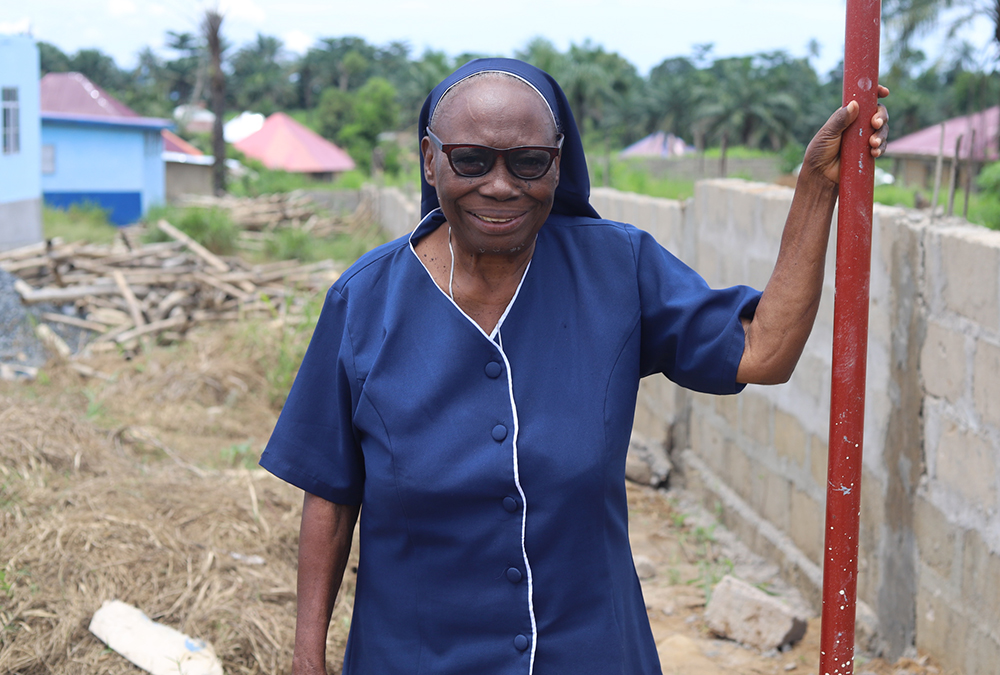
Sr. Elizabeth Onwuama of the Missionary Sisters of the Holy Rosary witnessed the civil war before she fled in 1994 for safety to Guinea and Nigeria. After the civil war was officially declared over in 2002, Onwuama returned with other sisters and began to help survivors and perpetrators recover from trauma. They also promoted forgiveness and reconciliation. (GSR photo/Doreen Ajiambo)
The sisters met victims in their homes, churches, and other gatherings, asking them to rebuild and forgive the injustices committed against them by rebel soldiers and even government troops.
"We always prayed and shared the word of God with victims of the war wherever we met them," said Sr. Teresa McKeon of the St. Joseph of Cluny congregation. "We told them that unless they forgive each other, there is no guarantee that there will never be another war."
McKeon, an Irish missionary, stayed in Sierra Leone during the civil war and helped the injured who had been shot or amputated and left on the streets for dead to get food and medication. When she left the country briefly in 1994, the nun served in Guinea until 2001, where she worked with Sierra Leonean refugee women, children under 5, and young girls in several refugee camps.
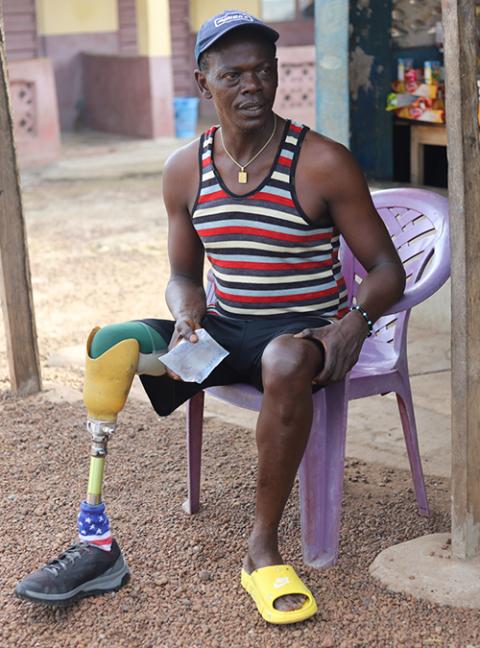
Mohamed Santigie Bangura, 45, whose leg was amputated after he was shot in the leg by the rebel soldiers during Sierra Leone's civil war, narrates how religious sisters have helped him heal from trauma and reconcile with his attackers. (GSR photo/Doreen Ajiambo)
The nun was recently granted Sierra Leonean citizenship by the government in recognition of her work, including during the civil war.
"During our forgiveness campaigns, we told victims that to avoid the recurrence of whatever was happening, they had to forgive," she recalled, saying that their message resonated with the victims. "The process was slow because you cannot force someone to forgive. It had to come from the heart. You just have to do your best, and God will do the rest."
The survivors agreed with the religious sisters, saying the path to forgiveness was not easy without God's intervention. The survivors told GSR that the nuns used to invite them to the trauma healing and community dialogue sessions. They received counseling and learned about forgiveness.
"I was very angry and not ready to forgive anyone who murdered my family, shot my leg and left me for dead," said the 45-year-old Mohamed Santigie Bangura, whose leg had to be medically amputated. "But when sisters came to my house and talked about forgiveness, the message started to sink deep into my heart, and I began to feel better. They kept encouraging me to move forward with life and forgive my offenders."
Bangura noted that although the religious sisters' ministries are rooted in Catholic beliefs, the nuns have assisted survivors and perpetrators in healing and recovery regardless of their race, religion, or ethnicity. The country's statistics from 2020 show that 77% of the population is Muslim and 22% Christian.
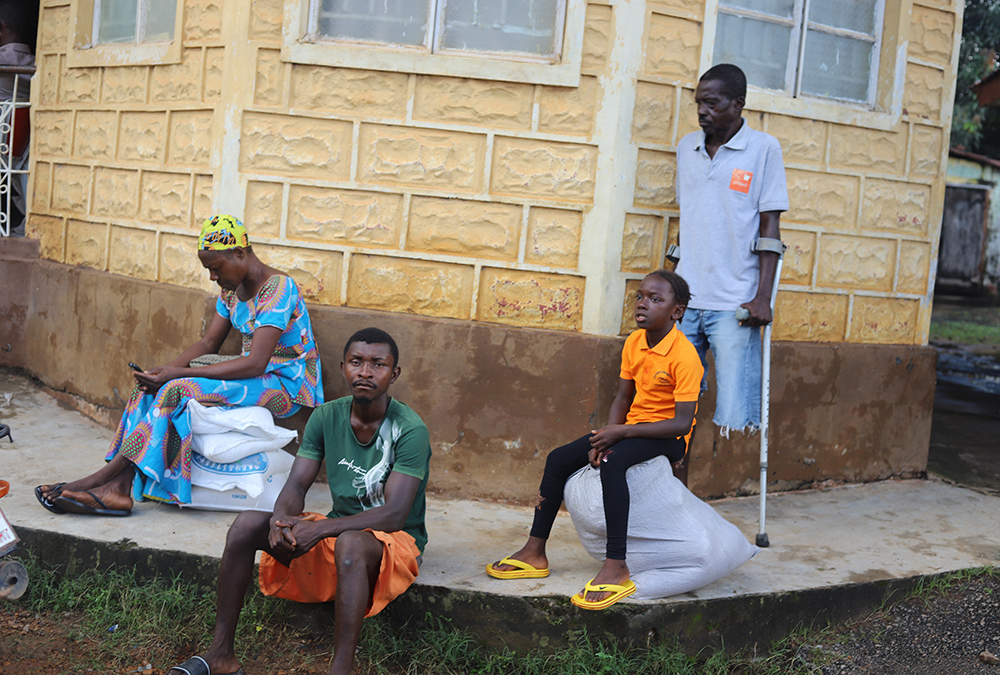
One of the amputees at Oslo Amputee Camp in Makeni, a town in northern Sierra Leone, joins his family during a session on peace, healing, and reconciliation organized by religious sisters. The sisters have been visiting homes, villages, and other gatherings nationwide to carry out sessions on forgiveness and reconciliation since the end of the civil war in 2002. (GSR photo/Doreen Ajiambo)
Pursuing reconciliation and reintegration
After months of preaching forgiveness, the sisters began visiting child soldiers in the rehabilitation centers in Freetown and other towns, seeking to heal trauma and bring together victims and perpetrators to unite and reconcile.
The sisters said their program was meant to bring together RUF soldiers and survivors to share their painful experiences and discuss issues of conflict and contention. Through these conversations, the sisters said people were encouraged to forgive each other, to reconcile and rebuild their broken relationships.
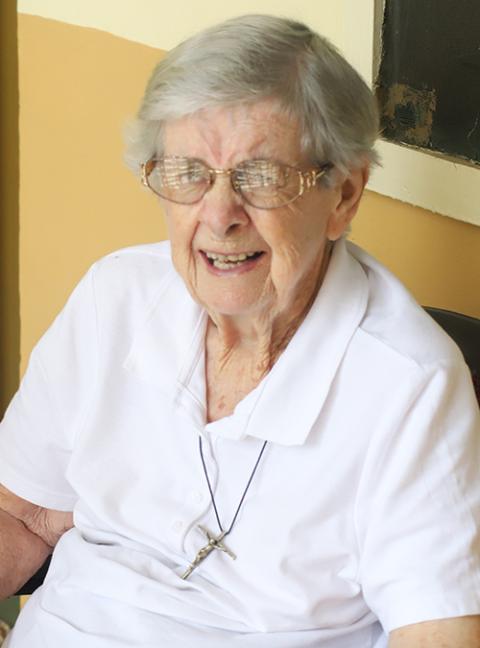
Sr. Teresa McKeon of the St Joseph of Cluny congregation narrates how she and the other sisters have helped survivors and perpetrators of the civil war in Sierra Leone reconcile and heal from trauma. (GSR photo/Doreen Ajiambo)
McKeon said during their regular visits, some child soldiers admitted to their crimes after the sisters counseled them and shared the word of God, a message that at first "came as a mockery to some, but slowly, they began to accept that God is the one who saved them."
Kemba said he was able to confess to his involvement in the civil war after the sisters took him through trauma counseling and testimonial therapy. He said the program helped Sesay meet him and four others who played a role in killing her family members.
"One day, the sisters took us to the outskirts of Freetown to meet a group of survivors. During the discussion, one woman spotted me as one of the people who had participated in killing her husband," Kemba recalled, referring to Sesay. "She started shouting at me, and everyone turned to look at me. I was afraid and shaken. I was lost in thought on what to do, and I started crying as I stepped outside the hall."
Kemba said the sisters took him and Sesay outside the hall, and they started counseling them, asking them to forgive each other and reconcile.
"God loves us all equally, and if God can forgive us no matter the wrongs we do every day, we should also follow his example and forgive others," Sesay said sisters told her, prompting her to forgive Kemba.
"Despite the pain, I was able to forgive him, and we shook hands," said Sesay. "He also apologized for killing my husband and the bad things he had done to other people, and now we live peacefully."
Advertisement
For the last two decades since the civil war ended, Onwuama said the sisters have built peace and healing between survivors and perpetrators through forgiveness in the face of pain and trauma.
"We have also been able to reintegrate thousands of child soldiers after doing trauma healing because many had been rejected in society by their victims," said Onwuama, noting that the church had for a very long time been providing funds to build houses and install wells for child soldiers, amputees, and other victims.
Today, sisters have established schools throughout the country as a way of preventing future conflict. Onwuama said education is critical in fostering lasting peace as it enables children to access and understand information, analyze it, and make sound decisions.
"The thought of starting schools came as an aftermath of war because if you look back during the war, many people joined it because they were not educated," she said. "They didn't even know what they were fighting for. I believe that once you educate society, people will have a chance to think for themselves and make sound decisions."




